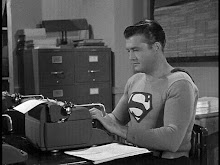My girlfriend sent this link to me, and it's for a NY Times article about the death of small-time booksellers due to the rise in yard-sale booksellers. With so much technology swirling around us all the time, we are always only two steps away from being strangled with our own HDMI cables. But books have a feeling of security, that they will always be there for us. But when it becomes too expensive to make paper and cheaper to produce everything as files for our iphones, will we still be able to crack the pages of a newly printed book, ruffle through it, and have that evocative and distinct "new-book smell" waft up out of the pages?
http://www.nytimes.com/2008/12/28/weekinreview/28streitfeld.html?emc=eta1
There is a story that, when a young doctor-in-training, Arthur Conan Doyle took money to buy his lunch every day. But instead of lunch, he would buy a used book from a bookseller near his office. Those used books remained some of his most treasured possessions until his death. Books can have history. I love knowing that someone before me pawed through those pages, loved the story, connected with the characters, and then wanted to pass it on. You can't have that sort of connection with a digital file on your computer or your ipod.
Subscribe to:
Post Comments (Atom)

1 comment:
So very true, Nick. It's been a long time since I purchased a book (new or used) for entertaining reading (shame on me). Yet I can definitely recall appreciating the smell of a book as I read it, new or used! Just last week I was visiting my mother and she had a book copyright 1911 - it was great gently picking it up and tenderly leaf through the battered cover and pages (it was dripping with an unknown nostalgia). But I can also appreciate contemplating having hundreds of books literally in the palm of my hand either in a PDA or flashdrive. They could travel with me, and not take up any of the very limited space in my apartment. I have always appreciated both antiquity and technology, which at times has caused an odd internal conflict. Reading the NY Times article did invoke some sadness.
Post a Comment